Build an Online Store in 10 Min. Instead of 10 Months!!
Ever since 2000s, all beauty supply retail store owners have heard of the importance of online sales too many times. Amazon has surpassed Walmart in market capitalization a long time ago, and most consumers are going online for most of their shopping needs as witnessed by many business owners on the retail floors. Moreover, the coronavirus pandemic has increased the importance of contact-less transactions in retail.
One of the reasons that business owners have not executed the plan for having an online presence for their store was the difficulty of building a website. Not to mention the cost, building a website and operating it through learning how to code would be a non-starter for many.
However, the time has passed for building websites with coding. You can easily sell your products via social media, and there are many platforms where you can custom-order your website for a small payment.
BNB considered many options for retail business owners to start an online sale now, and we determined that Shopify and Facebook and Instagram Shops were the most easily executable options. Here, we will discuss how to start selling online on each platform.
Shopify
You don’t need to know about computers if you’re with Shopify
Shopify is currently No. 1 in website building services and will likely continue to be. The biggest reason for success of Shopify is “easiness.” Even if a beauty supply storeowner does not know a thing about computers, Shopify will build a professional-grade website in a second. In fact, you can build and run an online shopping mall without knowing how to code.
Comparatively, it is cheaper to operate on Shopify than building a website elsewhere. This brought in a lot of small businesses into Shopify. In the first half of 2020, the total revenue in retail sales via Shopify recorded 31 billion dollars, which was only second to Amazon. Although it is often compared with Amazon, their business models are different. Amazon buys sellers’ goods and resell them, but Shopify only provides the platform and entrusts all the authorities to the sellers. One can run the store independently under their own business name.
While entrusting all the selling rights, it is very thorough in website management. From building a website to payment processing, security system, and tax calculation, logistics and shipping, all aspects of shopping mall operation are included in the service. Business owners can focus on selling goods, and they can improve their performance based on monthly analyses of the website, which are offered under some plans.
We Actually Built a BNB Magazine Website on Shopify.
We actually built a website for BNB. It was surprisingly simpler than we thought. It only took 10 minutes to finish a website.
Step 1
Enter an email address and business name.
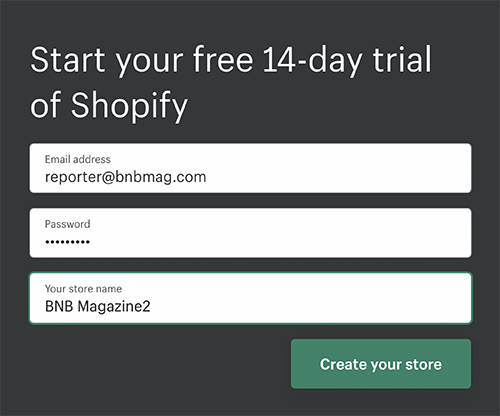
Step 2
Answer the questions about the purpose of the website.
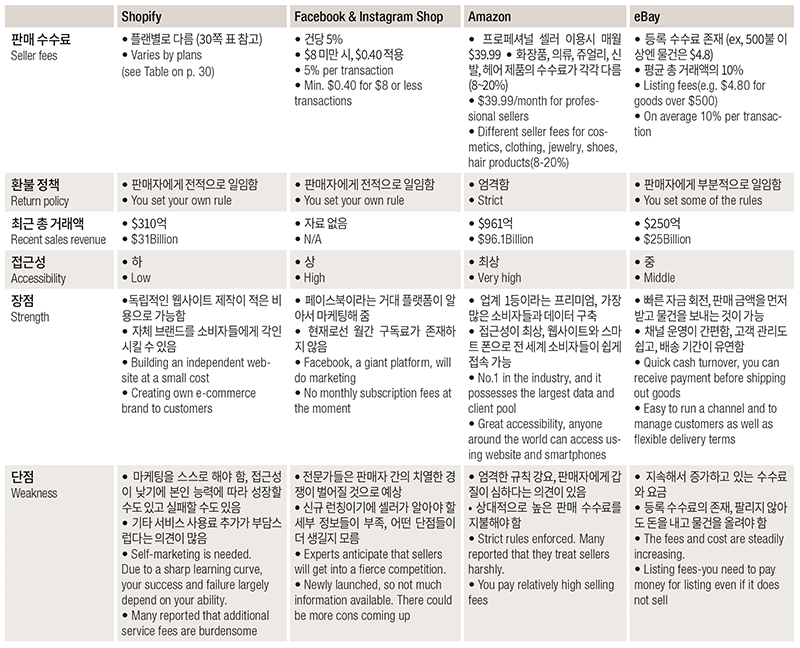
*Amazon sellers pay a lot more fees for a consignment sale.
↓
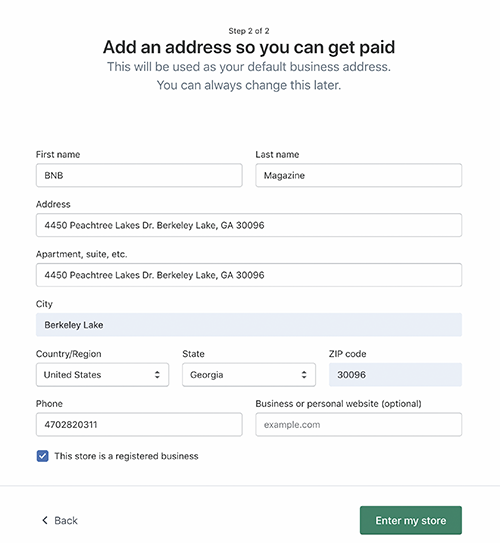
Step 3
Lastly, you set up the layout of your website based on your preference. You can choose a plan, theme design, and so on as you like.
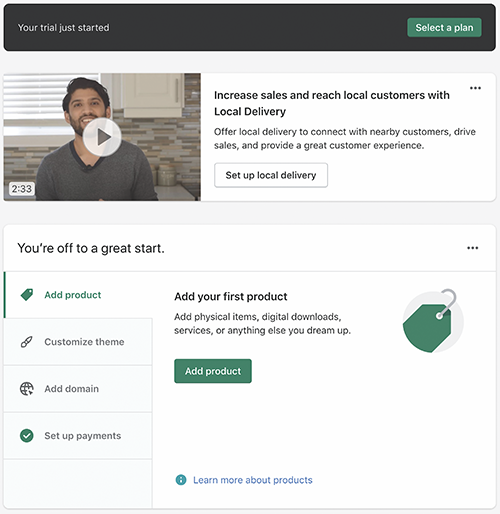
Step 4
A completed BNB Magazine’s own website. Now, you can simply register your product and pictures.
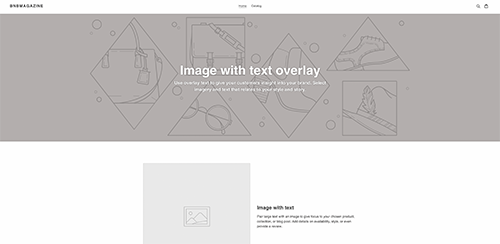
What varies by plan?
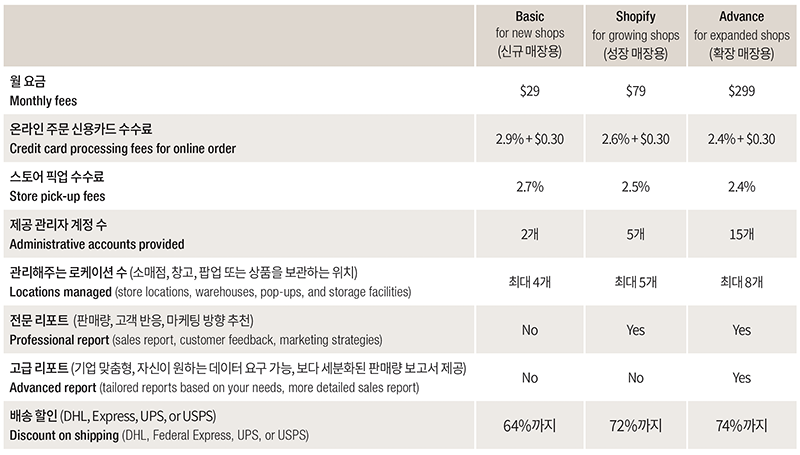
Pros and Cons from Actual Users
Pro: Customer’s Impression on the Store!
“This is a great marketing tool and branding for our own business. If you sell goods on other platforms, the focus in on your goods, right? Here, you can use your own domain and logos to promote your store image. For example, if you sell goods on Amazon, ordinary customers only remember Amazon but never our business; on the other hand, if you sell goods here, they would remember ‘I bought braids from XX beauty supply.’ This is great for generating goodwill. If you are thinking about online sales in a long run, nothing beats Shopify.”
Con: You are always worried about when they would start ripping you off. Premium features are already a burden.
“Even if you can sell products at your will, you still are part of the Shopify enterprise. I get some anxiety from the fact. We don’t know how much they would increase monthly subscription fees. I’m also worried about my sales data in their possession. You need to pay extra fees for each feature added… For example, for adding a social media login, you need to pay $9 a month more. Although only optional, they can add up to $380 if you want all of the features provided by Shopify.
Facebook & Instagram
Facebook Shop and Instagram Shop are here! Facebook & Instagram enters into the retail business.
Did they get the idea during the COVID-19 crisis? Facebook officially started their e-commerce business. On May 19, 2020, Facebook announced the release of Facebook Shops and Instagram Shops. This service is a free extension to existing Facebook or Instagram service.
If a retail store already has a Facebook account, it can’t get better than this. While you only used Facebook to promote your business and run promotions, now you can actually generate revenues right away. You can simply click Shops menu in your account to register goods to be sold online. This is actually simpler than building a website on Shopify.
It is not much different on Instagram. You can go to your profile, and in settings you will see Shopping category added under Business. If you upload your products under an appropriate category, you can start selling them just like that.
If you have a Facebook account, you can link it to your Instagram account. Two platforms are actually provided by a single entity, so you can basically assume them identical. The method of selling and management of accounts are similar in two services.
What about new users? We created a New Facebook Shop account for BNB.
Step 1
You enter basic information to create a Facebook account, and you access Facebook Commerce Manager page.
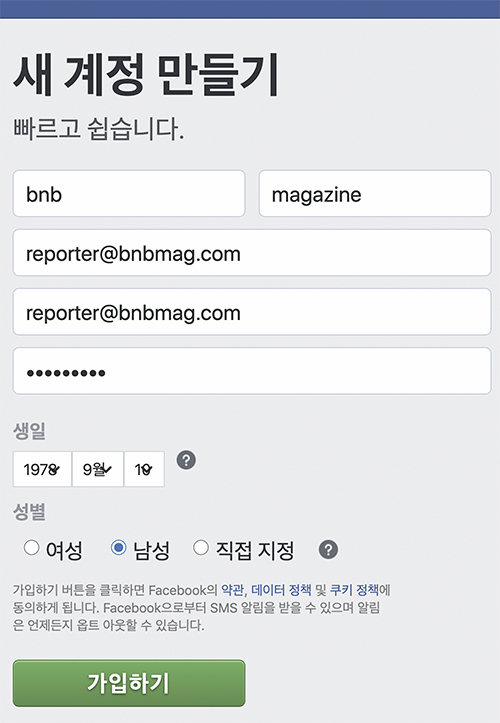
Step 2
Log in with your account credentials, and provide sales purpose and basic information about your store. Then, “agree” to create your shop.

↓

↓
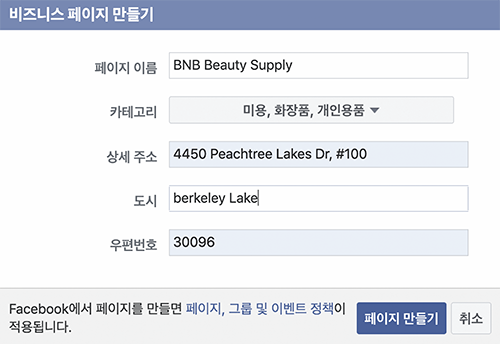
↓
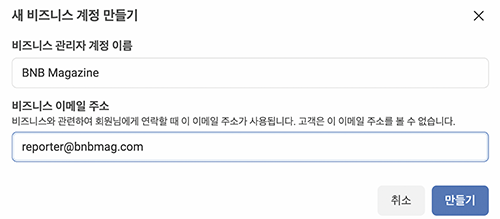
Step 3
After you select features you want, you will see Shop menu on your page.
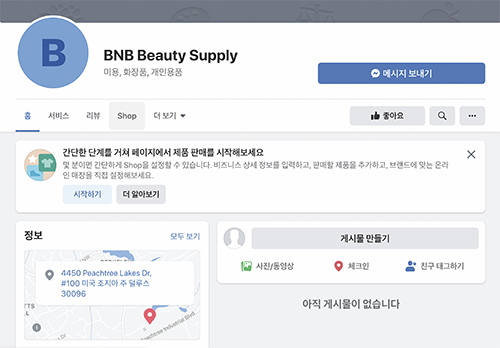
Pros and Cons from Actual Users
Pro: No initial investment or marketing cost for Facebook Shop!
“Most of all, you will see the most advantage in no-cost setup. Overhead is inevitable in building a website to sell products somewhere. You don’t incur any cost for Facebook and Instagram Shops. Marketing is effortless performed by Facebook algorithm. If you search a product sold at beauty supplies, you will see more advertisements of beauty supply products. This type of targeted marketing is very costly, but Facebook makes it free for you. Another biggest merit would be an extensive pool of users.”
Cons: Worries about a new market and anxiety about upcoming fierce competition among sellers.
“Well… You know. It’s about being too casual. I feel like goods are sold and consumed too casually. Customers might forget that they purchased a good from our store let alone from Facebook Shop. Also, it’s released only recently. You don’t know what side effects it might bring. Additionally, many sellers are already coming in, so the competition will gradually get fierce, I expect. You know everyone will get the same benefit and sell on the same website.
Comparisons of Main Features
